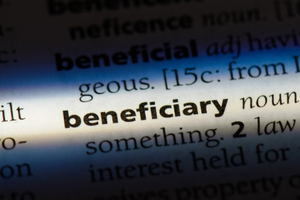Do You Need a Contingent Beneficiary on Your Estate Planning Documents?
 Estate plans allow you to pass on assets of both financial and personal value to your loved ones upon your death. The individuals you choose to designate assets to are called beneficiaries. Choosing beneficiaries and deciding how to distribute your possessions is no easy feat and there are many different factors to consider. This is why most estate planning lawyers encourage people to take their time and weigh their options carefully when creating a will, trust, or other estate planning document.
Estate plans allow you to pass on assets of both financial and personal value to your loved ones upon your death. The individuals you choose to designate assets to are called beneficiaries. Choosing beneficiaries and deciding how to distribute your possessions is no easy feat and there are many different factors to consider. This is why most estate planning lawyers encourage people to take their time and weigh their options carefully when creating a will, trust, or other estate planning document.
When choosing beneficiaries, many people overlook a crucial question: What happens if a primary beneficiary is unable or unwilling to receive the assets designated to them by the will or other estate planning document? Life is full of unexpected events, challenges, and obstacles. The person you choose to leave a certain asset to may not be in a position to receive that asset upon your death. This is why it is so important to name contingent beneficiaries.
Primary Versus Contingent Beneficiaries
The individuals who are first in line to receive property through a will, trust, retirement plan, or life insurance policy are referred to as primary beneficiaries. Contingent beneficiaries are second in line to receive the property. If a primary beneficiary named in an estate planning document cannot be located or has passed away, the contingent beneficiary will receive the assets instead.
Consider an example: A man names his sister as the primary beneficiary of his estate. Unfortunately, the sister falls ill and passes away before the man has a chance to change his beneficiary designation. What happens to the assets that were left to the sister? If the man has named a contingent beneficiary, the contingent beneficiary receives the assets instead of the sister. If the man did not have a contingent beneficiary, the assets would likely be returned to the estate and go through the probate process.
Probate can be costly and may delay the distribution of assets. Furthermore, there is no guarantee that the probate court’s decisions will be in line with what the deceased person wanted. Choosing a contingent beneficiary, or even better, multiple contingent beneficiaries, ensures that your assets are distributed according to your wishes, not state law.
Factors to Consider When Choosing Beneficiaries
When selecting primary and contingent beneficiaries, consider who would benefit from inheriting your property and who you can trust to manage the property appropriately. Think about whether you want certain assets, such as family heirlooms, to remain in the family. Also, consider how assets should be distributed if your primary beneficiaries cannot receive the assets. You may want to consider designating a charity or non-profit organization as your contingent beneficiary. This way, you know that if your primary beneficiaries cannot accept your assets, your assets will still end up benefiting a cause you care about.
Contact Our Naperville Estate Planning Lawyers for Help
When drafting your estate plans, it is important to name both primary and contingent beneficiaries. For help setting up your will, living trust, and other estate planning documents, contact the Naperville estate planning attorneys at the Gierach Law Firm. Call 630-756-1160 for a confidential consultation.
Source:
Practice Areas
Archive
+2016
+2013
Please note: These blogs have been created over a period of time and laws and information can change. For the most current information on a topic you are interested in please seek proper legal counsel.














